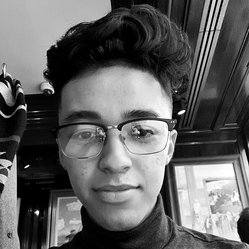
A walking irony
A walking irony
By Alexis Puente | May | June 2020
It would be cliché and common for me, as a part of the Hispanic community, to state that college education is important because of my past — where I came from, and the circumstances that have challenged and molded my very being. Though this statement holds true, to me a college education is imperative because of how it can impact my future.
Throughout all of my elementary and middle school education, I was the child who got in trouble. Referrals, suspensions, fights, riots… anything you can think of! On one specific occasion, I started a massive fight between two different middle schools. I was the kid who never engaged in class and was ordinarily disruptive. It progressed from cussing at my kindergarten teacher, to throwing pencils and talking back and trashing the restrooms and pantsing my peers, and drawing inappropriate pictures and stealing. The list is unceasing. I simply did not care about my education. It got to the extent where my vice principal had to come to my house to speak with my parents. These behaviors and failures were prevalent in every single area of my life.
Then, eighth grade was approaching, and my mind began to visualize the future. It was not an abrupt shift, but rather one that had to, and is, undergoing a process. I began to ponder on how my future would be. As of that instance, it did not look pleasing.
I remember vividly, during my eighth grade PE class, I was sitting crisscross on the cold cement under where the shade of the roof covered an outdoor basketball court. Since PE testing was coming up, my teacher Mr. Joliff was explaining to the PE period that they were going to offer some type of award called the “Presidential Award.” This award was given to those who passed the exam and met higher requirements. One of the prerequisites was to run one mile in about six minutes and 48 seconds, in eighth grade. I didn’t have the proper running shoes, clothes or equipment to prepare because, to be honest, I was not in shape. Part of it was because I never wanted to run the mile, so I would always rebel.
But during this time, I was learning to use what I did have to get to where I want. I began to train for the mile. At my school, we would run on Mondays for PE. For the kids who needed to make up their mile, they had the option to redo their mile on Wednesday. I would run with those people. This time I did it not because I was in trouble, but because I was training in hard, unbendable and worn-out basketball shoes. My coach would time me along with the other students making up their mile.
It was challenging to get to school in the mornings to train because I don’t live with my dad, and my only source of transportation was my single mother, who works in the mornings to raise a family of six. I would ride my bike or skateboard a little over two miles to get to school every day. The worst part was that it was all uphill. Two days before the exam, I beat my mile record with six minutes and 43 seconds. I remember walking up the steps from the track field, next to the very teacher I did not like or respect in seventh grade, as he glanced at me and said, “It’s a pleasure… to see you run.”
During eighth grade, I took a computer science class and quickly became fascinated with the field. Our class was even visited by cloud architect Lynn Langit, who developed a coding curriculum for K-12. Many of the kids in my class were going to Canyon High School, and because the class wanted to continue to grow in computer science, we wanted to take AP Computer Science. I had never heard of an AP class until my friends mentioned that it would save me money in college, provide college credits and build my GPA. I went with the flow because I wanted challenges and something new.
At that time, Valley View High School was the only school that had AP Computer Science. For some reason, I had the genius idea to email the superintendent of the district, Dr. Martinrex Kedziora, so he could get me a transfer to Valley View High School to take AP Computer Science. He seemed to be someone who could do something about it, so I emailed him. His response was extremely supportive. I remember he replied, “I will go personally to the registration center and transfer your name.” I felt overwhelmed by the amount of support and affirmation I received. After I thanked him, he replied: “My pleasure – please let me know if you need anything else.” And of course, I ended up giving him a list of other students who wanted to take AP Computer Science at Valley View High School, along with asking a couple of other favors. I didn’t even end up taking the course at my high school — I took it at the University of California, Riverside during the summer.
During ninth grade, I was reminiscing on some of these impactful events, and recalled how I beat my mile record. I realized that it was not so much the running my teacher Mr. Joliff liked seeing, but the determination I was displaying. I thought to myself, “I do not want to struggle in life, like I have, or how my family has.” I saw bad examples as good examples of what not to be, and refocused my determination.
I had never heard of an AP class until my friends mentioned that it would save me money in college, provide college credits and build my GPA.
When I think about the effort and perseverance that goes into my education as a Latinx student, I perceive generations that are redirected to success and abundance through modern standards of excellence. When I consider how valuable my education is to me, I notice my 3-year-old brother, with his Nemo backpack, aspiring to both follow in my footsteps and set a higher bar than me to live an educated life. And it is not a competition. It is generational progress, because it’s never been about me or someone, but rather everyone.
When I reflect on how vital college is to me, I see myself astonished by the amount of information I did not acknowledge in a lecture hall of 500 students with the same ambition to become and grasp something greater. It’s crucial, because it’s a beacon of light and hope — a hope that has transformed the way I think, communicate, learn and practice. I have become a healthier me. Now, I can honor those around me with the more salubrious versions of myself because I did not settle for ignorance. Still, I must admit, I am far from perfection. Yet, that’s never been the goal. Excellence has.
I am not neglecting where I came from. On the contrary, I utilize my parents’ struggles and determination to fuel my courage to confront the culture of failure in the Hispanic community, to surpass the predominant failure that has been embedded as inadequacy in the tradition. It is a place of comfort and complacency. What I am expressing is this — collegiate education is something that had to become vital in my life, because education was never something encouraged. The truth is, if it was not for God’s grace, I would be in the streets right now, doing drugs and maybe having to drop out to get a job to pay child support.
Now, I understand. The minor goal that I set to PR in my mile for the presidential award was going to be a small reflection of the larger goals I would accomplish in life for His Glory. Little did I know that the hill I would strenuously attempt to surpass every day to get to school was a process that is now developing into this extended metaphor that flows in abundance. The outcome of this process has been the revelation that life should not just be lived, but lived in excellence, and also by not forgetting from where your joy and foundation originated. Education is something I yearn to pursue, through a Ph.D. in Chemical Engineering, but most importantly beyond a degree. It’s a lifestyle that I am warmly embracing.
Alexis Puente is a student at Valley View High School in the Moreno Valley Unified School District

